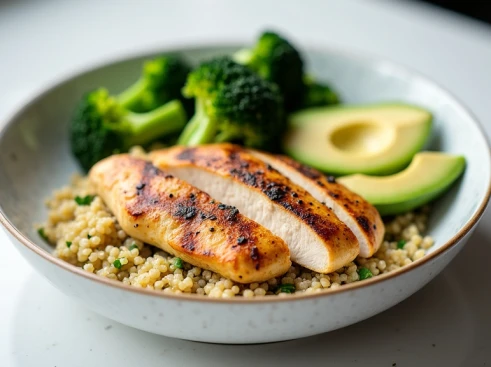As a fitness professional who’s followed low-carb meals for over two decades, I’ve seen firsthand how the right nutrition strategy can transform men’s health and physiques. Whether you’re looking to shed stubborn fat, maintain hard-earned muscle, or simply feel more energized, smart low-carb eating could be your path to success.
Studies have shown impressive results for men following well-designed low-carb meal plans. Research from the University of Connecticut found that men can gain muscle mass on a low-carb, high-protein diet – even without exercising. When combined with proper strength training, the muscle-building and fat-burning potential becomes even more powerful.
But let’s be clear: this isn’t about eliminating all carbs or following unsustainable crash diets. The evidence-based approach to low-carb eating focuses on optimizing your macronutrient balance while ensuring you get the nutrients needed to thrive. BUBS Naturals and other forward-thinking nutrition companies are making it easier than ever to maintain muscle mass while cutting carbs through targeted supplementation.
In this guide, you’ll discover how to craft satisfying low-carb meals that align with your goals. I’ll share practical strategies for meal planning, smart food choices, and simple recipes that deliver results.
Note: This article contain affiliate links. If you purchase through these links, we may earn a commission at no extra cost to you.
Understanding Low Carb Diets: Benefits for Men’s Health

A well-formulated low-carb diet offers powerful benefits for men’s metabolic health. Research published in the New England Journal of Medicine demonstrates that men following low-carb diets consistently achieve greater weight loss compared to those on traditional low-fat diets.
Beyond weight management, low-carb diets show remarkable effects on key health markers. Studies reveal significant improvements in triglycerides, HDL cholesterol levels, and blood pressure – all critical factors for cardiovascular wellness in men.
For blood sugar management, the evidence is compelling. Clinical studies demonstrate that restricting carbohydrates helps stabilize insulin and glucose levels, making low-carb approaches especially beneficial for men with type 2 diabetes or prediabetes.
Impact on Male Hormones and Energy
Many men report experiencing higher energy levels and mental clarity after adopting a low-carb lifestyle. The steady fuel supply from fat adaptation prevents the energy crashes commonly associated with high-carb diets.
Research suggests promising effects on testosterone levels. The combination of increased healthy fat intake and reduced insulin spikes may support optimal hormone production in men.
Inflammation markers typically decrease on low-carb diets, evidenced by lower C-reactive protein levels in multiple studies. This reduction in inflammation benefits both joint health and cognitive function.
Practical Benefits for Men’s Lifestyle
The simplicity of low-carb eating appeals to men seeking straightforward nutrition plans. By focusing on protein-rich foods and healthy fats, calorie counting becomes unnecessary.
Appetite control is a significant advantage. The higher protein and fat content of low-carb diets enhances satiety, helping men feel satisfied while naturally reducing overall calorie intake.
Athletic performance improves as the body adapts to using fat for fuel. Men regularly report enhanced endurance and strength when combining low-carb nutrition with consistent exercise.
Essential Nutrients in Low Carb Meals for Men
Maintaining adequate nutrition is crucial for men’s overall health and performance when following a low-carb diet. Low-carb food sources provide essential nutrients that support muscle maintenance, hormone production, and energy levels.
High-quality proteins form the foundation of a well-structured low-carb diet. Research indicates men should consume approximately 1 gram of protein per pound of target body weight to support muscle preservation and growth.
Fatty fish like salmon serves as a nutritional powerhouse, delivering both protein and essential omega-3 fatty acids. These healthy fats reduce inflammation and support cardiovascular health.
Key Nutrients for Men’s Health
Vitamin D is essential for men following a low-carb lifestyle. This fat-soluble vitamin supports testosterone production, bone health, and immune function.
Magnesium, abundant in low-carb foods like spinach and almonds, regulates blood pressure and supports muscle function. Men often require increased magnesium during exercise, making it particularly important.
Zinc maintains healthy testosterone levels and supports immune function. This mineral is concentrated in low-carb options like oysters, beef, and pumpkin seeds.
Fiber-Rich Low Carb Options
While reducing carbohydrates, adequate fiber intake supports digestive health and manages hunger. Non-starchy vegetables like broccoli and cauliflower provide essential fiber while maintaining low carb counts.
Avocados combine fiber and healthy fats effectively, offering 13 grams of fiber per 100 grams with minimal net carbs.
Studies have shown that men following a low-carb diet who incorporate these nutrient-dense foods experience improved HDL cholesterol levels and reduced triglycerides.
Maintain electrolyte balance by including salt and potassium-rich foods like leafy greens in your meals, especially when first transitioning to a low-carb diet.
| Nutrient | Low Carb Source |
|---|---|
| Thiamine | Sunflower seeds |
| Folate | Spinach |
| Vitamin C | Bell peppers |
| Magnesium | Almonds |
| Iron | Red meat |
| Vitamin D | Salmon |
| Vitamin E | Avocados |
| Calcium | Cheese |
| Protein | Chicken |
| Omega-3 Fatty Acids | Mackerel |
Planning Your Low Carb Meal Strategy

Determining Your Daily Carb Target
To begin meal planning effectively, establish your daily carbohydrate limit. Current research indicates that a low-carb diet typically contains less than 130 grams of carbohydrates per day.
For weight loss and metabolic benefits, some experts recommend consuming between 50-100 grams of carbs daily. Very low-carb diets may restrict intake to 20-50 grams per day for more dramatic results.
Your optimal carb intake depends on factors like age, activity level, and health goals. Athletes and highly active individuals may require additional carbs to support performance and recovery.
Creating Your Weekly Meal Framework
Start by selecting 3-4 main protein sources as the foundation of your meals. Choose options like eggs, chicken, fish, and grass-fed beef that provide essential nutrients without carbs.
Build your meals around low-carb vegetables like leafy greens, broccoli, cauliflower, and zucchini. These provide fiber, vitamins, and minerals while maintaining low carb counts.
Incorporate healthy fat sources such as avocados, olive oil, nuts, and seeds. These enhance satiety and provide sustained energy throughout the day.
Smart Meal Prep Strategies
Batch cook proteins like grilled chicken breasts and ground beef for multiple meals throughout the week. These provide convenient protein options for various dishes.
Prepare vegetable sides by roasting large batches of broccoli, bell peppers, and zucchini. Having ready-to-eat vegetables simplifies low-carb meal planning.
Portion out snack-sized containers of nuts, cheese cubes, and cut vegetables. These grab-and-go options support your low-carb goals between meals.
Planning for Dining Out
Research restaurant menus beforehand to identify low-carb options. Most establishments offer protein-based entrées that can be modified to suit your needs.
Don’t hesitate to request substitutions like extra vegetables for starches. Many restaurants willingly accommodate dietary preferences.
Select simple grilled meats, salads, and vegetable sides when dining out. Be mindful of sauces and dressings that may contain hidden sugars and carbs.
Snack Planning Essentials
Keep portable low-carb snacks like nuts, seeds, and cheese sticks easily accessible. These prevent impulsive high-carb food choices.
Prepare vegetable sticks with dips like guacamole or ranch dressing for satisfying snack options. The fiber promotes fullness between meals.
Include protein-based snacks like hard-boiled eggs or deli meat roll-ups. These offer sustained energy without affecting blood sugar levels.
Delicious Low Carb Meal Ideas
Creating satisfying low-carb meals doesn’t mean sacrificing flavor or feeling hungry. Modern approaches combine protein-rich ingredients with creative alternatives to traditional carbs, delivering meals that truly satisfy.
Let’s explore ten mouth-watering meal options that will keep you energized and satisfied throughout the day.
Protein-Packed Breakfast Options
Transform your morning routine with a spinach and goat cheese omelet packed with nutrients. Each bite delivers essential proteins while keeping carbs minimal for sustained energy.
For a heartier option, consider bacon-wrapped shrimp paired with avocado. This combination provides healthy fats and protein while offering a delicious twist on traditional breakfast fare.
Satisfying Lunch Solutions
Create a filling lunch with Greek sheet pan chicken loaded with feta and colorful vegetables. This Mediterranean-inspired dish offers robust flavors while keeping carbs in check.
Another excellent option is keto-friendly chicken Florentine, featuring tender chicken sautéed with baby spinach and mushrooms in a creamy garlic parmesan sauce.
For a lighter alternative, try protein-rich tuna melts served in zucchini boats, offering the satisfaction of a sandwich without the carbs.
Hearty Dinner Ideas
Indulge in a juicy filet mignon with mushroom sauce, perfectly seasoned and topped with a flavorful white wine reduction. This elegant meal proves low-carb dining can be sophisticated and satisfying.
Experience the comfort of Italian cuisine with chicken parmesan, using gluten-free breading that delivers the perfect crunch without the carbs.
For seafood lovers, try garlic butter steak bites paired with roasted asparagus. This combination offers rich flavors while maintaining your low-carb goals.
Customization Tips
Adjust portion sizes based on your specific macronutrient needs. A good rule of thumb is to fill half your plate with non-starchy vegetables, one-quarter with protein, and the remaining quarter with healthy fats.
| Diet Type | Carbohydrates (%) | Protein (%) | Fat (%) |
|---|---|---|---|
| Atkins Diet | 5-15% | 20-30% | 55-75% |
| Moderate-Carb, Low-Fat Diet | 45% | 35-40% | 15-20% |
| 40/30/30 Diet (Zone Diet) | 40% | 30% | 30% |
| Ketogenic Diet | 5% | 25% | 70% |
| Carnivore Diet | 0-10% | 20-35% | 65-80% |
| Paleo Diet | 35% | 30% | 35% |
Consider incorporating Momentous supplements to support your nutrition goals. Their NSF Certified for Sport products can help fill any gaps in your dietary needs. Remember to stay hydrated throughout the day.
Transform these meal ideas into your own signature dishes by experimenting with different herbs and spices. The key is finding combinations that excite your palate while supporting your health goals.
Optimizing Performance with Low Carb Nutrition
High-intensity training demands precise nutritional strategies, especially when following a low-carb approach. Recent research supports targeted carb timing and cycling for optimal performance, moving beyond traditional carbohydrate-loading protocols.
Elite athletes like endurance runners and CrossFit competitors demonstrate that well-structured low-carb diets can enhance both performance and body composition. Success depends on implementing protocols that align with individual training demands.
Strategic Carb Timing for Peak Performance
Precise nutrient timing becomes essential when carbs are limited. Research shows that strategic carbohydrate consumption around training sessions maximizes performance and recovery benefits.
Pre-workout nutrition should prioritize easily digestible protein and targeted carbs 1-2 hours before training, ensuring stable blood sugar and readily available energy for intense efforts.
Post-workout nutrition presents a vital window for recovery. Consume 25-50g of quality carbs within 30 minutes after intense training while maintaining your low-carb approach.
| Workout Type | Timing | Carb Intake |
|---|---|---|
| Low-Intensity Workout (<60 min) | Not necessary | Optional |
| Moderate-Intensity Workout | 1-2 hours before | 50-75g |
| High-Intensity Workout (>90 min) | During | 30-60g/hour |
| Endurance Events | Before and During | 60-90g/hour |
| Post-Workout Recovery | Within 30 minutes | 25-50g |
Implementing Carb Cycling for Enhanced Results
Carb cycling combines metabolic flexibility with performance optimization by alternating between higher and lower carb days based on training intensity and recovery needs.
On high-intensity training days, increase carb intake to 100-150g to support performance and recovery. Use rest days and light training sessions to maintain stricter low-carb protocols, enhancing fat adaptation.
Successful carb cycling requires matching carbohydrate intake to activity level. Intense training days demand more carbs, while recovery periods emphasize protein and healthy fats.
Supporting Energy and Recovery
A well-designed low-carb approach requires strategic supplementation for optimal performance. Electrolytes play a vital role as reduced carb intake affects mineral balance and hydration.
MCT oil, featured in BUBS Naturals products, delivers rapid energy during high-intensity efforts without significant carb intake, serving as an efficient fuel source.
Recovery supplements rich in amino acids and minerals support muscle maintenance and training adaptation while maintaining low-carb principles.
Conclusion: Embracing a Low Carb Lifestyle for Optimal Health
Scientific evidence and growing success stories demonstrate that a low-carb approach offers a powerful pathway to better health, particularly when enhanced with trusted supplements from BUBS Naturals.
As we’ve explored, reducing carbohydrate intake leads to improved metabolic health, sustainable weight management, and enhanced mental clarity. Research shows that low-carb diets effectively promote fat loss while regulating blood sugar and increasing beneficial cholesterol levels.
Remember that this journey is highly individual – what works for one person may need adjustment for another. Focus on whole, nutrient-dense foods while finding the right carbohydrate balance for your unique needs and lifestyle.
Long-term success stems from informed choices and sustainable healthy habits. Support your low-carb lifestyle with BUBS Naturals’ premium collagen peptides and MCT oil powder.
Fuel your body with the best from BUBS Naturals – clean, high-quality supplements for peak performance. Enjoy 20% off your order with code MidlifeMale – shop now!






